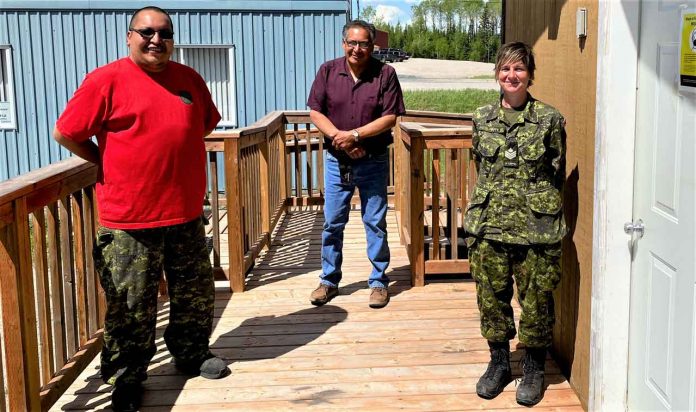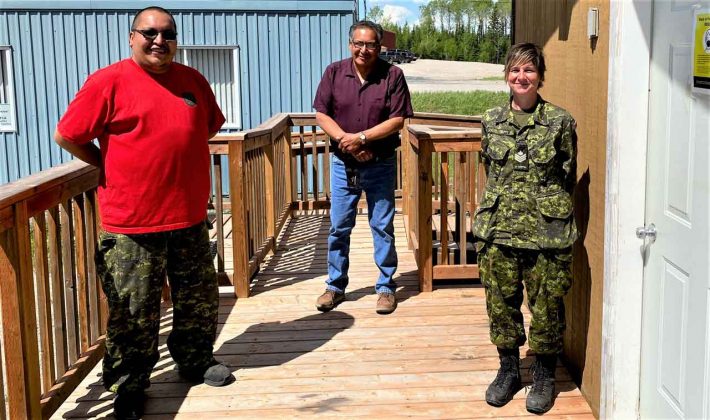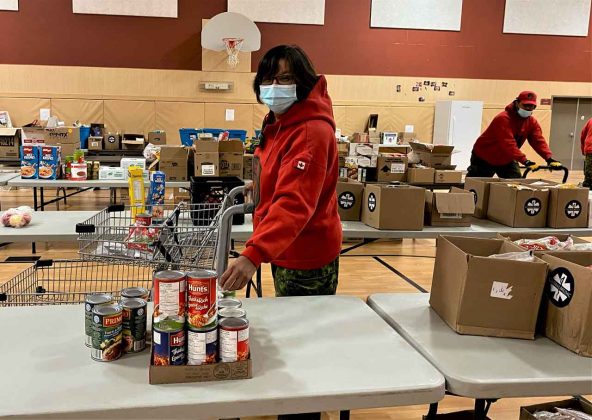
LAC SEUL FN ONTARIO – A small number of Canadian Rangers are playing a big part in helping a small First Nation cope with a serious outbreak of COVID-19.
Lac Seul First Nation declared an emergency on May 2 when 44 of its residents tested positive for COVID and it asked for assistance from the Canadian Army. The army responded by sending three full-time soldiers to the community, which has a population of about 1,000 and is 320 kilometers northwest of Thunder Bay. It also activated three Canadian Rangers from the Lac Seul Ranger patrol and four from Long Lake No. 58 First Nation. The Rangers are part-time army reservists.
The First Nation and its staff were overwhelmed by the number of COVID cases and the community went into lockdown. The military contingent provided a range of supports to the frightened community. It delivered food and water to housebound residents, collected their mail, delivered toys and games to children, conducted wellness checks, liaised with the chief and council, provided transportation, and gave humanitarian assistance.
The number of COVID cases has now dropped from 44 to 12.
“There was a lot of anxiety at the beginning,” said Lac Seul Chief Clifford Bull. “People were scared and very afraid of getting COVID.
“But, oh man, the Rangers were helpful, very helpful. We very much appreciate all the support they gave us. We could not have handled it without them. The sight of their red sweaters and ball caps, their boots on the ground, that meant help to us. They have been great.”
Sergeant Freeman Ningewance , who commands the Lac Seul Ranger patrol, said he was frightened when the army asked him to go on active duty to help his community. “I was scared of catching COVID,” he said. “All the Rangers were. People were panicking but we wanted to help.”
The response of the community to the army presence has been rewarding, he said. “We go to their doors to deliver food and toys for the kids and we get big smiles and thank you’s. It makes it all worthwhile.”
Sergeant Janet Butt, a new Ranger instructor, said living on the reserve during the crisis has been a memorable experience. “It is a first time experience living on a reserve for me,” she said. “I’m really enjoying it. The people are great. All the Rangers I have with me are so great. It has been an amazing experience working with them.”
Lieutenant-Colonel Shane McArthur, who commands the 600 Rangers in 32 First Nations across the Far North of Ontario, said he is proud of what the Rangers are doing in Lac Seul. “They are always doing things that make positive differences in their communities,” he said. “It always amazes me when they rise to challenges and answer a call for help as they are doing in Lac Seul. COVID causes all kinds of problems. So their fear is a real concern. But it makes me very proud when they and the three support staff from our headquarters answer a call for help from a community.”
The Rangers from Lac Seul are Sergeant Ningewance, Master Corporal Rita Brisket, and Ranger Terrance Angeconeb. The Rangers from Long Lake No. 58 are Rangers Lionel Abraham, Reed Finlayson, Jody Grenier, and Curtice Waboose. The three full-time soldiers are Warrant Office Carl Wolfe, Sergeant Butt, and Corporal Randy Jones.
(Sergeant Peter Moon is the public affairs ranger for the 3rd Canadian Ranger Patrol Group at Canadian Forces Base Borden.)








